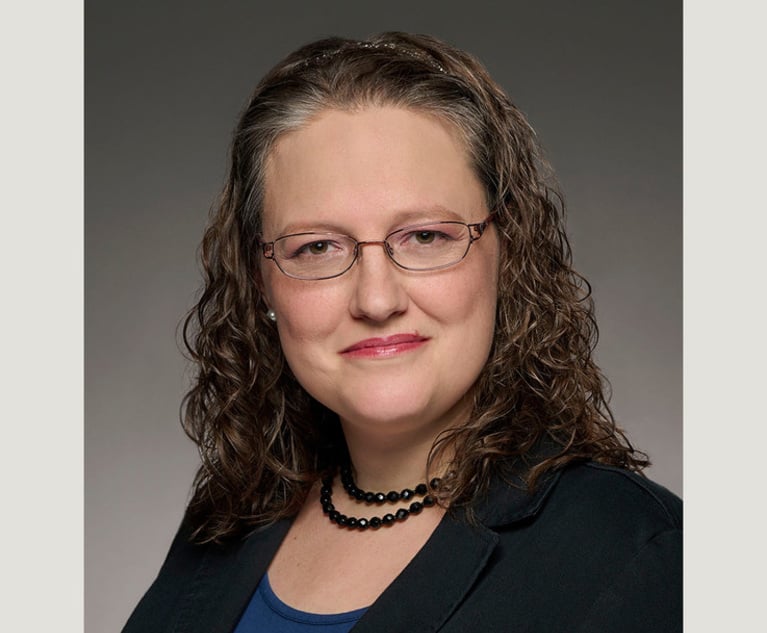Delaware ACLU Challenge to Inadequate School Funding Gets Green Light
A Delaware Court of Chancery judge has refused to dismiss a lawsuit accusing state and county officials of failing to provide adequate school funding for disadvantaged students, thanks in part to outdated property tax assessments.
October 08, 2018 at 05:41 PM
5 minute read
The original version of this story was published on Delaware Law Weekly
 Photo Credit: skynesher/iStockphoto.com
Photo Credit: skynesher/iStockphoto.com
A Delaware Court of Chancery judge has refused to dismiss a lawsuit accusing state and county officials of failing to provide adequate school funding for disadvantaged students, thanks in part to outdated property tax assessments.
Vice Chancellor J. Travis Laster on Oct. 5 said that he has jurisdiction to decide whether Delaware's three counties are complying with state law requiring property to be assessed at fair market value.
In a 25-page memorandum opinion, Laster said two plaintiff groups, represented by attorneys from the American Civil Liberties Union of Delaware, had supported allegations that the counties have been ignoring the mandate for decades. While the law does not require counties to conduct assessments on any particular schedule, Laster said the court could grant equitable relief, if he finds an ongoing violation of state law.
“This court also can adapt its decree to accommodate changed conditions. Through the exercise of its equitable jurisdiction, this court will be in a position to consider the facts and circumstances, balance the equities,” Laster wrote.
ACLU attorneys sued the county finance directors in January, claiming that low-income students, children with disabilities and English language learners are not being provided with enough resources to succeed in school.
A key part of the complaint targeted the officials' adherence to a provision of the Delaware code requiring that the local portion of public school funding be based on the property's “true value in money,” which the state Supreme Court has held equates to its “fair market value.” However, property in Delaware continues to be assessed at values from three to four decades ago. New Castle County last assessed property values in 1983, and Kent County's assessment dates back to 1987. Sussex County hasn't assessed property values since 1974.
The plaintiffs did not allege any personal wrongdoing by the individual defendants; rather they sued the officers in their official capacities as property-tax collectors. The suit also named Gov. John Carney, Secretary of Education Susan Bunting and state Treasurer Kenneth Simpler as defendants.
The officials moved to dismiss the suit in April, arguing that the Chancery Court lacked subject matter jurisdiction over the complaint. The plaintiffs, they said, were essentially asking for an order compelling the counties to conduct a general assessment and should instead petition the Superior Court for a writ of mandamus.
But Laster said such a petition was not available in this case because the Delaware law does not require counties to conduct general assessments on any regular schedule. Instead, the plaintiffs had made a “classic appeal to the powers of equity,” arguing that so much time had passed since the last assessments that the current system no longer meets the mandatory value requirement.
“Because the statute does not specifically command when general assessments are to take place, only this court could grant that relief,” he wrote.
“What the plaintiffs ask for is an equitable remedy that will restore compliance with the market value requirement. What form that remedy takes will be determined after trial, based on the evidence, taking into account the equities, and after hearing from all parties. To state the obvious, the court will only reach that issue if the plaintiffs prevail.”
Delaware public schools rely on local property taxes for about one-third of their revenue, with the rest of the funding coming from state and federal sources. However, median property values in Delaware have increased 116 percent since 1980, according to Laster's opinion.
The result, Laster said, was a tax base that remains flat while operational costs continue to increase, leaving school boards to repeatedly ask voters to approve tax hikes in a series of special elections.
“Confronted with regular requests for tax increases, some residents naturally infer that school officials are wasting money. Community resentment does not help the public schools or disadvantaged students,” he said.
The ACLU has said the funding gap particularly impacts disadvantaged students, whose standardized test scores, the organization said, fall well below the state's own benchmarks.
According to the lawsuit, 64 percent of low-income students, 85 percent of English language learners and 86 percent of students with disabilities did not meet the state standards in grades three through eight for English language arts. At the same time, 74 percent of low-income students, 81 percent of English learners and 89 percent of students with disabilities fell below the state's math standards in those grades.
Among other things, the plaintiffs are seeking permanent injunctions compelling the officials to “establish, fund and maintain a general and efficient system of free public schools that provides all disadvantaged students.”
ACLU attorneys Ryan Tack-Hooper and Karen Lantz are representing plaintiffs Delawareans for Educational Opportunity and the NAACP Delaware State Conference of Branches.The plaintiffs are also represented by Richard H. Morse and Brian Eng of Community Legal Aid Society Inc.
Herbert W. Mondros and Helene Episcopo of Margolis Edelstein represent Gina Jennings, Sussex County's director of finance. William W. Pepper and Gary E. Junge of Schmittinger & Rodriguez represent Susan Durham of Kent County. Adam Singer and Mary A. Jacobson of New Castle County Office of Law represent David M. Gregor of New Castle County.
The case is captioned Delawareans for Educational Opportunity v. Carney.
This content has been archived. It is available through our partners, LexisNexis® and Bloomberg Law.
To view this content, please continue to their sites.
Not a Lexis Subscriber?
Subscribe Now
Not a Bloomberg Law Subscriber?
Subscribe Now
NOT FOR REPRINT
© 2025 ALM Global, LLC, All Rights Reserved. Request academic re-use from www.copyright.com. All other uses, submit a request to [email protected]. For more information visit Asset & Logo Licensing.
You Might Like
View All
3rd Circ Orders SEC to Explain ‘How and When the Federal Securities Laws Apply to Digital Assets’
5 minute read
Womble Bond Dickinson's Wilmington Office Sees New Leadership as Merger Is Completed
4 minute read

Trending Stories
- 1Reviewing Judge Merchan's Unconditional Discharge
- 2With New Civil Jury Selection Rule, Litigants Should Carefully Weigh Waiver Risks
- 3Young Lawyers Become Old(er) Lawyers
- 4Caught In the In Between: A Legal Roadmap for the Sandwich Generation
- 5Top 10 Developments, Lessons, and Reminders of 2024
Who Got The Work
J. Brugh Lower of Gibbons has entered an appearance for industrial equipment supplier Devco Corporation in a pending trademark infringement lawsuit. The suit, accusing the defendant of selling knock-off Graco products, was filed Dec. 18 in New Jersey District Court by Rivkin Radler on behalf of Graco Inc. and Graco Minnesota. The case, assigned to U.S. District Judge Zahid N. Quraishi, is 3:24-cv-11294, Graco Inc. et al v. Devco Corporation.
Who Got The Work
Rebecca Maller-Stein and Kent A. Yalowitz of Arnold & Porter Kaye Scholer have entered their appearances for Hanaco Venture Capital and its executives, Lior Prosor and David Frankel, in a pending securities lawsuit. The action, filed on Dec. 24 in New York Southern District Court by Zell, Aron & Co. on behalf of Goldeneye Advisors, accuses the defendants of negligently and fraudulently managing the plaintiff's $1 million investment. The case, assigned to U.S. District Judge Vernon S. Broderick, is 1:24-cv-09918, Goldeneye Advisors, LLC v. Hanaco Venture Capital, Ltd. et al.
Who Got The Work
Attorneys from A&O Shearman has stepped in as defense counsel for Toronto-Dominion Bank and other defendants in a pending securities class action. The suit, filed Dec. 11 in New York Southern District Court by Bleichmar Fonti & Auld, accuses the defendants of concealing the bank's 'pervasive' deficiencies in regards to its compliance with the Bank Secrecy Act and the quality of its anti-money laundering controls. The case, assigned to U.S. District Judge Arun Subramanian, is 1:24-cv-09445, Gonzalez v. The Toronto-Dominion Bank et al.
Who Got The Work
Crown Castle International, a Pennsylvania company providing shared communications infrastructure, has turned to Luke D. Wolf of Gordon Rees Scully Mansukhani to fend off a pending breach-of-contract lawsuit. The court action, filed Nov. 25 in Michigan Eastern District Court by Hooper Hathaway PC on behalf of The Town Residences LLC, accuses Crown Castle of failing to transfer approximately $30,000 in utility payments from T-Mobile in breach of a roof-top lease and assignment agreement. The case, assigned to U.S. District Judge Susan K. Declercq, is 2:24-cv-13131, The Town Residences LLC v. T-Mobile US, Inc. et al.
Who Got The Work
Wilfred P. Coronato and Daniel M. Schwartz of McCarter & English have stepped in as defense counsel to Electrolux Home Products Inc. in a pending product liability lawsuit. The court action, filed Nov. 26 in New York Eastern District Court by Poulos Lopiccolo PC and Nagel Rice LLP on behalf of David Stern, alleges that the defendant's refrigerators’ drawers and shelving repeatedly break and fall apart within months after purchase. The case, assigned to U.S. District Judge Joan M. Azrack, is 2:24-cv-08204, Stern v. Electrolux Home Products, Inc.
Featured Firms
Law Offices of Gary Martin Hays & Associates, P.C.
(470) 294-1674
Law Offices of Mark E. Salomone
(857) 444-6468
Smith & Hassler
(713) 739-1250






